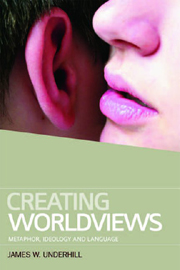Book contents
9 - Language in Metaphors
from Part II - Case Studies in Metaphor
Published online by Cambridge University Press: 12 September 2012
Summary
THE FRENCH LANGUAGE IS SO BEAUTIFUL, WE HARDLY DARE TOUCH HER
In his sardonic book-length account of the various representations attributed to the French language throughout history, De la langue française (1997), Henri Meschonnic quoted Rivarol, one of the ‘great priests’ who knelt down before the majesty of the French language, celebrating its purity, its clarity, its logic, its perfection and its universality. French at the time of Rivarol (the end of the eighteenth century) was the preferred language of European elites from Madrid to Moscow and was widely used as the language of diplomacy; and this was enough to convince Rivarol that the French language was ‘universal’. It was, he felt, the natural tongue of humanity, who logically inclined towards it as the most eloquent and appropriate means for expressing ideas. Rivarol even went as far as chastising himself for violating the perfection of the French language in his work as a lexicographer. Cutting up this work of perfection into words seemed to him almost indecent: ‘Ma besogne du Dictionnaire de la langue française, me fait penser à celle d'un amant médecin obligé de disséquer sa maîtresse’ (‘My task of writing the Dictionary of the French Language, makes me think of a lover-doctor who is called upon to dissect his mistress’) (Meschonnic 1997: 114). It is a curious state of affairs when a lexicographer chastises himself for explaining terms, as though extracting words from texts and contexts somehow maims the language.
- Type
- Chapter
- Information
- Creating WorldviewsMetaphor Ideology and Language, pp. 172 - 235Publisher: Edinburgh University PressPrint publication year: 2011

